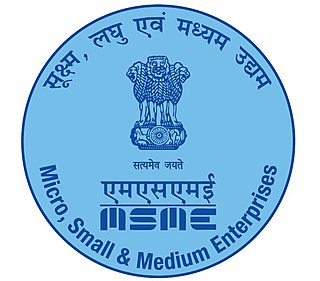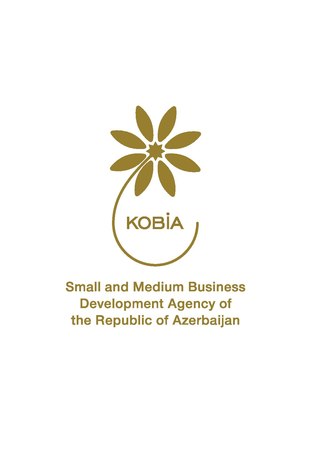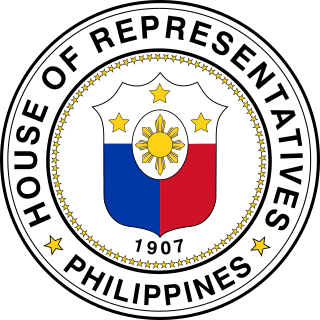Small and medium-sized enterprises (SMEs) or small and medium-sized businesses (SMBs) are businesses whose personnel and revenue numbers fall below certain limits. The abbreviation "SME" is used by international organizations such as the World Bank, the European Union, the United Nations, and the World Trade Organization (WTO).
A social enterprise is an organization that applies commercial strategies to maximize improvements in financial, social and environmental well-being. This may include maximizing social impact alongside profits for co-owners.

Social entrepreneurship is an approach by individuals, groups, start-up companies or entrepreneurs, in which they develop, fund and implement solutions to social, cultural, or environmental issues. This concept may be applied to a wide range of organizations, which vary in size, aims, and beliefs. For-profit entrepreneurs typically measure performance using business metrics like profit, revenues and increases in stock prices. Social entrepreneurs, however, are either non-profits, or they blend for-profit goals with generating a positive "return to society". Therefore, they use different metrics. Social entrepreneurship typically attempts to further broad social, cultural and environmental goals often associated with the voluntary sector in areas such as poverty alleviation, health care and community development.
A micro-enterprise is generally defined as a small business employing nine people or fewer, and having a balance sheet or turnover less than a certain amount. The terms microenterprise and microbusiness have the same meaning, though traditionally when referring to a small business financed by microcredit the term microenterprise is often used. Similarly, when referring to a small, usually legal business that is not financed by microcredit, the term microbusiness is often used. Internationally, most microenterprises are family businesses employing one or two persons. Most microenterprise owners are primarily interested in earning a living to support themselves and their families. They only grow the business when something in their lives changes and they need to generate a larger income. According to information found on the Census.gov website, microenterprises make up 95% of the 28 million US companies tracked by the census.

Small Industries Development Bank of India (SIDBI) is the apex regulatory body for overall licensing and regulation of micro, small and medium enterprise finance companies in India. It is under the jurisdiction of Ministry of Finance, Government of India headquartered at Lucknow and having its offices all over the country.The SIDBI was established on April 2, 1990, by Government of India, as a wholly owned subsidiary of IDBI Bank. It was delinked from IDBI w.e.f. March 27, 2000. Its purpose is to provide refinance facilities to banks and financial institutions and engage in term lending and working capital finance to industries, and serves as the principal financial institution in the Micro, Small and Medium Enterprises (MSME) sector. SIDBI also coordinates the functions of institutions engaged in similar activities. It was established in 1989, through an Act of Parliament.
Inclusive entrepreneurship is about a set of attitudes, competences and skills which allow people to turn their dreams into concrete projects or “enterprises” and then see these through to fruition. It is about more than starting an individual business. Inclusive entrepreneurship can be applied to self-employment, starting or growing micro or small enterprises and to social enterprise using business based approaches driven by social mission. Indeed, the personal qualities required for entrepreneurship are essential for success in the knowledge economy – whether this be in the private or public sectors.

The Ministry of Micro, Small and Medium Enterprises is the ministry in the Government of India. It is the apex executive body for the formulation and administration of rules, regulations and laws relating to micro, small and medium enterprises in India. The Minister of Micro, Small and Medium Enterprises is Narayan Rane.
Entrepreneurship is the creation or extraction of economic value. With this definition, entrepreneurship is viewed as change, generally entailing risk beyond what is normally encountered in starting a business, which may include other values than simply economic ones.
Youth Business China, abbreviated YBC, is a non-profit program in the People's Republic of China that aims to promote youth entrepreneurship. It is headquartered in Beijing.

The International Small Business Journal (ISBJ) is a peer-reviewed academic journal that covers the fields of economics and entrepreneurship, especially small businesses. The journal's editor-in-chief is Robert Blackburn. It was established in 1982 and is currently published by SAGE Publications. The ISBJ is a member of the Committee on Publication Ethics (COPE).

National Institute of Food Technology, Entrepreneurship and Management, Thanjavur (NIFTEM-T), formerly Indian Institute of Food Processing Technology (IIFPT), is an academic institution with Institute of National Importance (INI) status, functioning under the Ministry of Food Processing Industries (MoFPI), Government of India located at Thanjavur, Tamil Nadu. The institute offers academic and research programmes in the field of food processing technology. The institute has National Accreditation Board for Testing and Calibration Laboratories (NABL) accredited food quality testing laboratory which is also notified Food Safety and Standards Authority of India (FSSAI) Referral Food Laboratory. Food product development laboratory, food microbiology laboratory, post harvest pest management laboratory, food processing incubation center, and food engineering laboratories are in its main campus at Thanjavur. NIFTEM-T is operating liaison offices at Guwahati, Assam and Bathinda, Punjab. These liaison offices have facilities to give skill development trainings, incubation and consultancy services to the farmers, entrepreneurs and students in the field of value addition of agricultural produce and food processing technologies.

National Small Industries Corporation Limited (NSIC) is a Mini Ratna government agency established by the Ministry of Micro, Small and Medium Enterprises, Government of India in 1955 It falls under Ministry of Micro, Small & Medium Enterprises of India. NSIC is the nodal office for several schemes of Ministry of MSME such as Performance & Credit Rating, Single Point Registration, MSME Databank, National SC ST Hub, etc.

The Uganda National Entrepreneurship Development Institute (UNEDI) is a privately owned national resource development institution in Uganda whose focus area is entrepreneurship education, training and research. The institute provides training techniques, faculty support, consultancy, research as well as teaching and development of entrepreneurship training materials.

Sebrae, is a Brazilian autonomous social institution part of the Sistema S whose aim is to foster the development of micro and small enterprises, stimulating entrepreneurship in the country.

Anthony Charles Robinson is a business speaker, author and micro-enterprise campaigner.
Ellen Frances Golden is an American nonprofit executive specializing in micro-enterprise and women's business development. She was senior vice president of Coastal Enterprises, Inc. of Wiscasset, Maine, where she directed the Women's Business Center and CEI Investment Notes. She has testified before congressional committees on women's entrepreneurship and micro-enterprise development, and has sat on the boards of policy-making groups in these fields. She was inducted into the Maine Women's Hall of Fame in 2015.
The Social Enterprise Academy Nigeria is an educational and capacity development institution, which awards internationally recognized certificates and qualifications in the field of social enterprise to professionals and entrepreneurs in Nigeria. The Social Enterprise Academy Nigeria, is licensed by Social Enterprise Europe, and recognized by the Federal Ministry of Education in Nigeria.

Small Business Development Agency of the Republic of Azerbaijan(SMBDA) (Azerbaijani: Azərbaycan Respublikasının Kiçik və Orta Biznesin İnkişafı Agentliyi) is a public legal entity that supports the development of micro, small and medium businesses (SMB) in Azerbaijan, and provides support and a range of services to entrepreneurs, as well as coordinates and regulates public services in this area.

National Institute for Micro, Small and Medium Enterprises (ni-msme) is a national institute aimed to foster the progress of micro, small and medium enterprises in India under Ministry of Micro, Small and Medium Enterprises. NI-MSME is registered in Hyderabad, Telangana, under Public Societies Registration Act I of 1350 Fasli with effect from 1 July 1962. The affairs of the Society are managed, administered, directed and controlled through Governing Council constituted by the Government of India as per Rule 22(a & b) of Rules and Regulations of the Society. The Society, as provided under Rule 3 of Rules and Regulations, was constituted by the Government of India. The Institute has been working in the areas of capacity building, research, skill upgradation, job enrichment training in the field of Entrepreneurship and Skill including the development of women pursuing small trades at the cottage industry level from an Incubation centre at NI-MSME.

The Philippine House Committee on Micro, Small and Medium Enterprise Development, or House Micro, Small and Medium Enterprise Development Committee is a standing committee of the Philippine House of Representatives.











